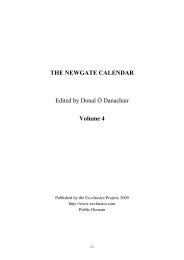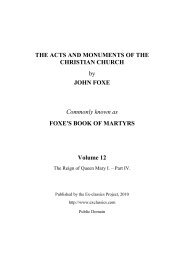PDF format (1.55 Mb) - The Ex-Classics Web Site
PDF format (1.55 Mb) - The Ex-Classics Web Site
PDF format (1.55 Mb) - The Ex-Classics Web Site
You also want an ePaper? Increase the reach of your titles
YUMPU automatically turns print PDFs into web optimized ePapers that Google loves.
THE ANATOMY OF MELANCHOLY<br />
choler, inflammations of the spleen and liver." Our English baths, as they are hot, must needs<br />
incur the same censure: but D. Turner of old, and D. Jones have written at large of them. Of cold<br />
baths I find little or no mention in any physician, some speak against them: Cardan alone out of<br />
Agathinus commends "bathing in fresh rivers, and cold waters, and adviseth all such as mean to<br />
live long to use it, for it agrees with all ages and complexions, and is most profitable for hot<br />
temperatures." As for sweating, urine, bloodletting by haemrods, or otherwise, I shall elsewhere<br />
more opportunely speak of them.<br />
Immoderate Venus in excess, as it is a cause, or in defect; so moderately used to some<br />
parties an only help, a present remedy. Peter Forestus calls it aptissimum remedium, a most<br />
apposite remedy, "remitting anger, and reason, that was otherwise bound." Avicenna Fen. 3. 20.<br />
Oribasius med. collect. lib. 6. cap. 37. contend out of Ruffus and others, "that many madmen,<br />
melancholy, and labouring of the falling sickness, have been cured by this alone." Montaltus cap.<br />
27. de melan. will have it drive away sorrow, and all illusions of the brain, to purge the heart and<br />
brain from ill smokes and vapours that offend them: "and if it be omitted," as Valescus<br />
supposeth, "it makes the mind sad, the body dull and heavy." Many other inconveniences are<br />
reckoned up by Mercatus, and by Rodericus a Castro, in their tracts de melancholia virginum et<br />
monialium; ob seminis retentionem saviunt sæpe moniales et virgines, but as Platerus adds, si<br />
nubant sanantur, they rave single, and pine away, much discontent, but marriage mends all.<br />
Marcellus Donatus lib. 2. med. hist. cap. 1. tells a story to confirm this out of Alexander<br />
Benedictus, of a maid that was mad, ob menses inhibitos, cum in officinam meritoriam incidisset,<br />
a quindecem viris eadem nocte compressa, mensium largo profluvio, quod pluribus annis ante<br />
constiterat, non sine magno pudore mane menti restituta discessit. But this must be warily<br />
understood, for as Arnoldus objects, lib. 1. breviar. 18. cap. Quid coitus ad melancholicum<br />
succum? What affinity have these two? "except it be manifest that superabundance of seed, or<br />
fullness of blood be a cause, or that love, or an extraordinary desire of Venus, have gone before,"<br />
or that as Lod. Mercatus excepts, they be very flatuous, and have been otherwise accustomed<br />
unto it. Montaltus cap. 27. will not allow of moderate Venus to such as have the gout, palsy,<br />
epilepsy, melancholy, except they be very lusty, and full of blood. Lodovicus Antonius lib. med.<br />
miscet. in his chapter of Venus, forbids it utterly to all wrestlers, ditchers, labouring men, &c.<br />
Ficinus and Marsilius Cognatus puts Venus one of the five mortal enemies of a student: "it<br />
consumes the spirits, and weakeneth the brain." Halyabbas the Arabian, 5. <strong>The</strong>or. cap. 36. and<br />
Jason Pratensis make it the fountain of most diseases, "but most pernicious to them who are cold<br />
and dry:" a melancholy man must not meddle with it, but in some cases. Plutarch in his book de<br />
san. tuend. accounts of it as one of the three principal signs and preservers of health, temperance<br />
in this kind: "to rise with an appetite, to be ready to work, and abstain from venery," tria<br />
saluberrima, are three most healthful things. We see their opposites how pernicious they are to<br />
mankind, as to all other creatures they bring death, and many feral diseases: Immodicis brevis est<br />
ætas et rara senectus. Aristotle gives instance in sparrows, which are parum vivaces ob<br />
salacitatem, short lived because of their salacity, which is very frequent, as Scoppius in Priapus<br />
will better inform you. <strong>The</strong> extremes being both bad, the medium is to be kept, which cannot<br />
easily be determined. Some are better able to sustain, such as are hot and moist, phlegmatic, as<br />
Hippocrates insinuateth, some strong and lusty, well fed like Hercules, Proculus the emperor,<br />
lusty Laurence, prostibulum fæminæ Messalina the empress, that by philters, and such kind of<br />
-36
















